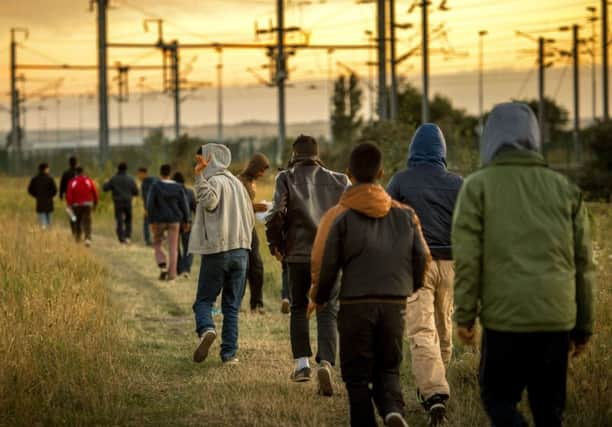Desperate need for calm over Calais


Readers of The Scotsman will share my concern for the daily news of desperate people trying to cross the Channel from Calais to Dover or Folkestone. We seem powerless to stop the flow of those intent on making it to the UK. Yet we have difficulty understanding the root causes for this human suffering. We wonder whether tough talk of sending troops to supplement the border police is a solution, we are uneasy about talk of dogs to locate, deter or contain refugees. We ask what propels individuals and families to risk their lives in travelling great distances at extreme risk. What can and should we do?
In Scotland we have an inward migration problem as stated in government thinking – we need more skilled and highly motivated people, we want individuals with drive and determination to contribute and succeed and yet the UK visa policy which Scotland must follow for now is geared to limit immigration or make it difficult to grant work visas and extensions to well-qualified graduates emerging from our business schools and universities. Do the developments in Calais present us with an opportunity to house some of the migrants in Scotland as other Northern European countries have done?
Advertisement
Hide AdAdvertisement
Hide AdFollowers of Asian affairs will be well aware of the “boat people” in the closing years of the Vietnam war and, more recently, the huge numbers being displaced in South-east Asia and the Middle East who are the victims of wars and protracted conflicts. United Nations figures indicate that last year almost 14 million people were forcibly displaced or more than 40,000 people fled their homes every day, even though in South-east Asia there have been no major wars for many years. For over three decades, more than a 100,000 refugees from Myanmar have been displaced in camps along the Thai-Myanmar border with no end in sight. More recently Thailand, Malaysia and Indonesia have been struggling to cope with a sizeable exodus of Rohingya people leaving western Myanmar by boat to escape persecution and violence. As of 2014, the number of displaced people as a result of persecution, conflict, violence and human rights abuses was 59.5 million.
Despite the coming together of Asean (Association of South-east Asian Nations) member states as a more unified grouping, there is no developed legal framework to allow asylum seeking in many of the member countries.
Speaking recently at the Ditchley Foundation near Oxford, Antonio Guterres, the former prime minister of Portugal and now United Nations High Commissioner for Refugees, made a very strong case for rapid action.
He emphasised three very human goals that all of us can relate to as far as refugees are concerned.
1 Saving lives.
2 Restoring hope to those who have lost everything.
3 Finding a way home or creating a new home in another country.
He urged Europe to take concerted action and pointed to the wider global challenge posed where scenes of suffering and the supreme frustration of those seeking a better life and being rejected is propaganda fodder for those whose interest is in radicalising the young and disrupting Western society.
Scotland has a long history of large numbers who have moved and settled elsewhere. The diaspora was in many ways formed by the restless urge for new opportunities in Asia, North America and India. Although not driven by the desperation that the media has often hyped, it should at least mean that as a nation we should have a better understanding than most. Later this year we will explore the whole subject when Sir John Holmes, director of the Ditchley Foundation and former UN Under-Secretary General for Humanitarian Affairs, considers the turmoil caused by mass migration, the crisis of refugees and the world’s humanitarian problems at a briefing in Edinburgh for the Asia Scotland Institute on 10 November. It is to be hoped that by then a leadership solution will begin to have been found.
• Roddy Gow OBE is chairman and founder of The Asia Scotland Institute www.asiascot.com